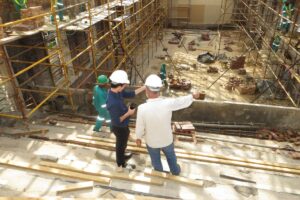Writer: Ryan Gandolfo
 2 min read September 2022— Growth in Nashville has been unparalleled over the past several years. In an effort to accommodate this boom, redevelopment and adaptive reuse projects have seen an uptick in neighborhoods throughout the city.
2 min read September 2022— Growth in Nashville has been unparalleled over the past several years. In an effort to accommodate this boom, redevelopment and adaptive reuse projects have seen an uptick in neighborhoods throughout the city.
In fiscal year 2021, the Nashville metro area surpassed $5 billion worth of construction permits, surpassing the previous year by more than $600 million. A key component of the planned developments has been adaptive reuse projects, a method of repurposing existing buildings for modern uses.
“It is important to communities that when we talk about reuse, we are talking about sustainability. We are trying to create less waste in our landfills. These types of projects are a great representation of what is possible because it helps to preserve the fabric of the city,” EOA Architects Principal Michael Murdock told Invest:.
The Nashville-based architecture firm is currently working on Emblem Park, a 346-unit mixed-use residential community with 13,000 square feet of planned retail space within the former Grooms Engine Warehouse.
“It helps because when we tear everything down, then it just gets built back bigger. This changes the quality of the place. The retail component in mixed-use means we are not just doing housing but trying to create an urban community. It makes where you live more interesting and viable. When you build a housing development, it doesn’t serve just the people who live there; it supports the surrounding area. This helps to support local communities,” said Murdock.
In 2021, global consulting firm AEA Consulting included adaptive reuse projects for the first time in its annual Cultural Infrastructure Index. The index tracks investment in large-scale capital projects across the cultural sector, covering the trend for more sustainable uses of buildings.
Adaptive reuse has been a popular concept in Nashville, especially concerning historic buildings that are closely tied to the city’s history and culture.
One of the recent developments, Eastwood Village, is being converted from a former church to a mixed-use space for residential, office and retail. The project is spearheaded by Vintage South, a developer with a penchant for adaptive reuse projects. According to Nashville Now Next, the church property was originally built in 1853 and continued to develop into the mid-20th century.
But even outside of Nashville, opportunities to redevelop underutilized spaces have become more of a focal point.
“In terms of targets for redevelopment, mall space across the country has become largely abandoned as developers turn to a new concept. Some of the older malls in Columbia are excellent targets for this kind of redevelopment. Retail is often overlooked within our market, so we hired a retail strategy coach to help us differentiate ourselves from neighboring cities,” City of Columbia Mayor Chaz Molder said in an interview with Invest:.
In Clarksville, an hour northeast of Nashville, the economic development team has created incentives for redevelopment projects in the urban core of the city.
“Our theme for this year is thoughtful growth. We are combating sprawl by creating four new economic redevelopment districts in our downtown core to support urban development. These redevelopment districts are currently not being utilized to their highest and best capacity. Within these districts there are brownfields, as well as former industrial areas and flood zones to overcome. There are 50- to 75-year-old warehouses, factories, and shops that are either empty or not fully occupied,” Clarksville-Montgomery County Economic Development Council President and CEO Buck Dellinger told Invest:.
“Those are the areas we are focused on, with established infrastructure in terms of gas, water and roads. We are trying to look inward to solve our housing opportunities instead of continuing to look out into the more agricultural areas. That is something both we as an organization and the community want,” said Dellinger.
For more information, please visit:

